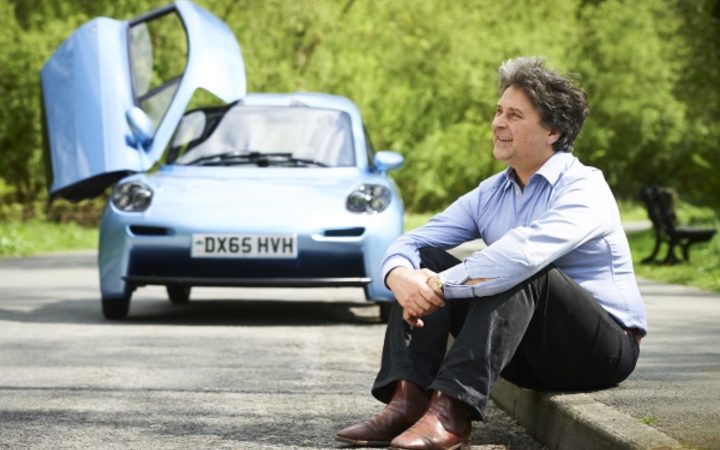Discuss the diagram:

First some basic vocab:
What is electrolysis?
Electrolysis is a scientific way of 'splitting' substances. Electrolysis means 'electric-splitting' and involves the separation of substances through an electric current. Metals above carbon in the reactivity series (potassium, sodium, lithium, calcium, magnesium and aluminium) are extracted by electrolysis.
What's the average horse power for a typical car?
A typical car in America has something around a 120-horsepower engine. A big SUV might have a 200-horsepower engine, and a tiny car might have only 70 horsepower.
What's a chassis?
Torque is a measure of the force that can cause an object to rotate about an axis. Force is what causes an object to accelerate in linear space. Torque is what causes an object to accelerate rotationally.
Watch:
River Simple
0:00 - 6:42
1. What is an iron bird? What is it for?
2. What does a fuel cell do?
3. Do River Simple cars have gears?
4. What is special about the wheels?
5. What is special about the brakes?
6. What happens to the energy generated by braking?
7. What's the difference between a battery and a capacitor?
8. What do the capacitors do?
9. Which parts of normal cars help them accelerate? Why might this make the car inefficient?
10. What's the difference between a fuel cell and a capacitor?
12. Why does your torque "drop off" when you're accelerating a normal car?
The River Simple
Business Model:
8:40 - 11:53
1. River Simple's business model:
The critical things is that River Simple doesn't
___ the ___
They sell a ____ _____ instead.
It has fixed rate element and _______ usage rate.
2. How are normal car manufacturers
rewarded for maximising resource consumption?
(What is "obsolescence"?)
3. Why does the service contract include
the fuel cost? What kind of fuel is used?
4. Why do River Simple want the car to
last as long as possible?
5. How are River Simple's interests aligned with their customers’ interests?
5. Who owns the fuel cell?
Hugo Spowers of Riversimple (Supplied)
"We want to design something people want, not just for eco guilt."
Will hydrogen-powered cars drive us into the future?
Electric cars like Nissan's Leaf and the Tesla are grabbing all the headlines, but big car makers like Toyota and Hyundai are pumping billions into hydrogen-powered technology. Toyota, for instance, expects 30 percent of all vehicles to be hydrogen powered by 2050.
It's fair to say that hydrogen has a bit of a post-Hindenburg image problem, and who knows where you'll be able to fill up, but it's not just the giants of the automotive industry who are backing the technology.
A small hydrogen-fuelled car company Riversimple calls itself the only independent hydrogen car startup in the world. It's about to start trials of its 2-seater car the Rasa in Wales.
We speak to its CEO Hugo Spowers, a former petrol head who's converted to hydrogen fuel cell technology.
Listen
River Simple
Start from 6.08 - 9.25
1. Why convert electricity into hydrogen? Why not just use electricity?
2. What's the really big difference between battery cars and hydrogen?
3. What is the biggest reason hydrogen is safer than petrol?
Go to the beginning
According to Hugo....
1. Why do humans like petrol engines?
2. What's wrong with them?
3. What are battery vehicles good for?
4. Why are battery cars inefficient over a longer distance?
5. How long have battery cars been around?
6. Which field of transport does Hugo describe as "esoteric"?
7. Why compare hydrogen with electricity?
8. What are the benefits of hydrogen from a customers point of view?
9. How do hydrogen cars work?
10. What is electrolysis in reverse?
11. What does the fuel cell do?
12. How is hydrogen usually produced? Why is it not zero-carbon?

No comments:
Post a Comment